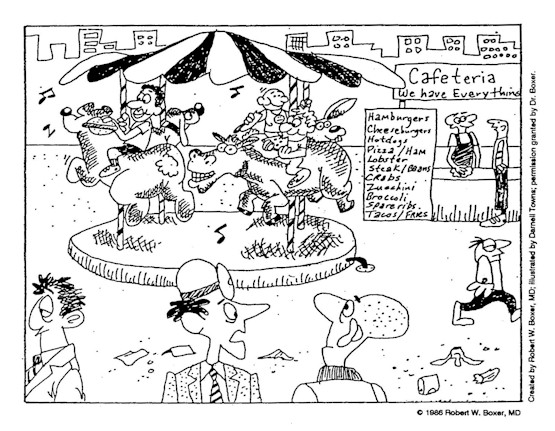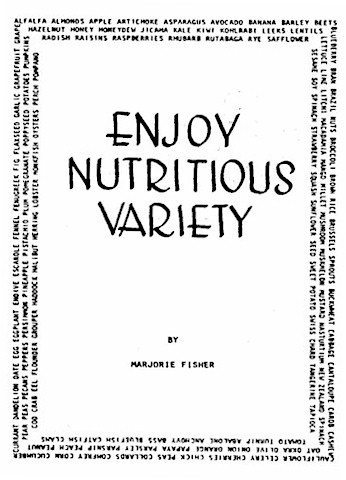FOODS AND CHEMICALS CAN MAKE CHILDREN ILL
Orange juice can make a child hyperactive and change his writing from excellent to illegible. Corn can cause temper tantrums. In the last 15 years NOHA speaker, pediatrician, and children's allergist, Doris Rapp, MD, has had numerous patients with these and many other symptoms that were caused by particular foods. Her latest book, Is This Your Child? Discovering and Treating Unrecognized Allergies, describes many of her patients. It is about "children who are complaining, cranky, slow learners, aggressive, hyperactive, unwell, or depressed."
Dr. Rapp was trained as a conventional allergist and followed the usual practices for 18 years. However, after attending a conference on food allergies, she expanded her practice during the past 15 years. She now tests many foods and chemicals, even at times extracts of the air from a child's classroom. A drop of allergy extract is placed under the tongue or in the outer layers of a child's skin. Then reactions are noted and can be neutralized with a weaker dilution of the same allergy extract. Dr. Rapp has observed amazing reactions from foods and chemicals: hyperactivity, aggression, fatigue, headaches, and seizures. These and many other symptoms can be provoked and neutralized by appropriate allergy treatment. Patients are encouraged to draw and write during testing. The changes from good writing to illegibility and back again are spectacular. Dr. Rapp has many videotapes of children in her office reacting.
Dr. Rapp has observed amazing reactions from foods and chemicals: hyperactivity, aggression, fatigue, headaches, and seizures.
Some simple diets can help the parents detect foods that are causing symptoms in their children. First, the "Single Food Elimination Diet," in which a single suspected food is eaten at four-day intervals. For example, the child could drink milk on Monday, then no dairy products in any form whatsoever would be ingested for the next three days. "On Friday, when the child has not eaten for at least three or four hours, the youngster is fed only milk and cottage cheese. Similar testing for other foods can be conducted on Tuesday and Saturday for bananas; Wednesday and Sunday for oats; . . . and so on." If the parents and child feel that it is impossible to eliminate a particular food even for three days, then they already have the answer: the child is addicted to that food! If the child is subject to severe reactions, for example, something like swelling in the throat, which could impede breathing, Dr. Rapp warns numerous times that testing must only be done under close medical supervision.

"No, this is not what Dr. Rinkel meant by a Rotary Diversified Diet."
When a food has been eliminated for some time it can often be reintroduced in a four-day rotation diet, which is similar to the one recommended by Dr. Rapp to help children and families on a long-term basis. In NOHA we have a booklet, Enjoy Nutritious Variety: Rotation Diet, (price, $3.00 - see bottom of page) that explains the four-day rotation that "involves eating any one individual food no oftener than once in four days and also alternating food families. In other words, after eating a particular food from a certain family, then wait until at least the second day before eating another food from the same family." NOHA Professional Advisory Board member, Theron G. Randolph, MD, checked over the booklet before we published it in1980. The introduction, taken from his 1971 pamphlet, The Realities of Food Addiction, explains vividly why we should rotate foods. For convenience Enjoy Nutritious Variety has several four-day menu examples, eliminating different families of foods that Dr. Randolph has often found troublesome for his patients; plus, an indexed classification of foods by families so that we can easily find out in which family a particular food belongs biologically. Finally, it has a short essay pointing out how monotonous our diets usually are and challenging people to branch out, try new things, and "ENJOY VARIETY."
Some simple diets can help the parents detect foods that are causing symptoms in their children. . . . If the parents and child feel that it is impossible to eliminate a particular food even for three days, then they already have the answer: the child is addicted to that food!
Dr. Rapp lists foods that most frequently cause allergies:
milk and dairy products (yogurt, cheese, ice cream, lactose, casein), wheat (bread, cake, cookies, baked goods), eggs, corn, sugar, chocolate (cocoa or cola), peas (peanut butter), citrus (orange, lemon, lime, grapefruit), food coloring, food additives, and preservatives. No luncheon meats, sausage, ham, or bacon, or canned soups are allowed. If there is some question about a specific food, or it is a favorite, even if it is not listed, do not eat it.
Symptoms can be well controlled by eliminating offending foods. However, if the excluded foods are important nutritionally, Dr. Rapp's office offers professional advice on ways to supply the missing nutrients. Sometimes food reactions can be controlled by using neutralizing drops that are carefully monitored for the correct potency, which can change over time.
Is This Your Child? was on the New York Times "Best Seller List" and is now coming out in paperback. Dr. Rapp has dedicated this book to Phil Donahue, who had her on two of his shows. Her first invitation resulted when NOHA speaker, George Shambaugh, MD, professor emeritus of otolaryngology at Northwestern University, was invited "because of his observations and publications indicating that ear problems, allergy, and hyperactivity occurred together in certain children." He had seen some of Dr. Rapp's videotapes and suggested that she should be invited instead, which she was. The response has been overwhelming because so many parents recognized their own children.
Dr. Rapp was the first speaker at a free public meeting, put on by the American Academy of Environmental Medicine, Sunday, October 25, 1992, 2PM at the Marriott Resort in Lincolnshire, Illinois. On Saturday she was the keynote speaker at a all-day session for parents and educators. Her topic will be: "'Here's One Good Reason Why Johnny Can't Learn!': The Amazing and Unsuspected Scope of the Learning, Behavioral, and Other Health Problems Caused by Adverse Reactions to the Diet and School Environment in School Age Children."
Article from NOHA NEWS, Vol. XVII, No. 4, Fall 1992, pages 1-2.

ENJOY NUTRITIOUS VARIETY
ROTATION DIET
by
Marjorie Fisher
may be purchased for $3.00, including postage,
handling, and Illinois tax from
NOHA
P.O. Box 380, Winnetka, Illinois 60093